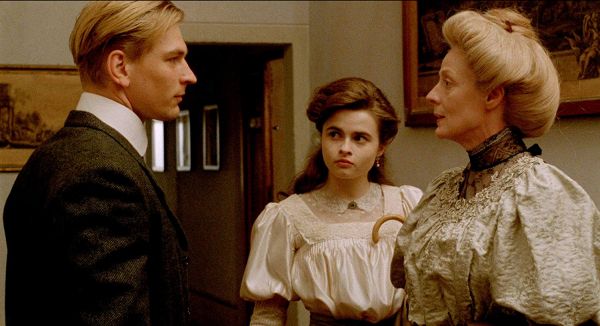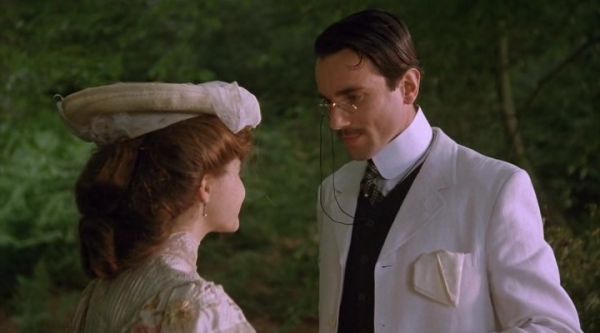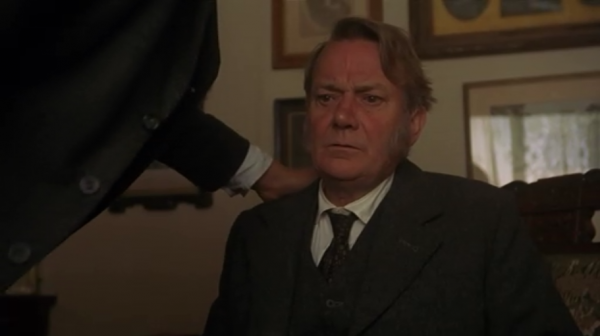A Room With a View Part 2
A Room with a View, Part Two
Few novelists in the English language can come close to the literary importance of E. M. Forster, even if he turns off the few modern readers who try to read him. Forster writes prose with an old-timey, linguistic artifice. His characters have the personal traits and stilted, repressed manners of Victorian England, that murders their spontaneity and hushes their passions. Modern readers may not realize that Forster recognizes poisons in his environment, and with a masterfully humane touch satirizes them.
In A Room with a View, for example, Forster describes English guests at a "pension" in Florence, a family-owned inn. One day, the guests travel by horse-drawn carriage into the Italian countryside. It is a beautiful Summer day. A young man George Emerson has met an Englishwoman Lucy Honeychurch and fallen for her. Before they know what hit them, George takes her in his arms and kisses her.
Even today, you could characterize George as brazen. Lucy has known him hardly two days. They have conversed meaningfully, but only briefly. Lucy's chaperone Miss Bartlett comes after George, reads him the riot act, and forbids him to ever lay eyes on her again. The next day, Lucy and her chaperone leave Florence, and that seems to be the end of it.

Julian Sands as George; Helena Bonham-Carter as Lucy; and Maggie Smith as Miss Bartlett
Besides the basic faux-pas of this situation, Lucy already has a steady boyfriend, and the chaperone already knows about him. He has already asked Lucy twice to marry him, and she has held him off. One assumes that they will marry eventually. They observe the Victorian protocols regarding relationships and have never allowed themselves a kiss.
But now, Lucy has two beaus. She may never see George again, but they have already embraced and kissed, and she can still feel it. George provides a huge personal contrast to Lucy's presumed future-husband, a young man named Cecil Vyse, a contrast that she can only vaguely intuit. In fact, Cecil and George are as different as day and night. George makes her tingle, but she really prefers Cecil, and the young men's characters say a lot about the presumptions in Lucy's decision-making process.
Lucy lacks a personal "room with a view"—which Forster has apparently taken from the writings of Swiss psychologist Carl Jung—a viewpoint from which she can interact with others, and a sense-of-self reinforced with personal reference points; so she allows herself to connect with Cecil Vyse, in order to have his reference points. As his name suggests, Vyse basically controls Lucy. He tells her how to think about things, what opinions to have, and how to decide about all things proper and improper. Cecil is fastidious, resentful, and haughty.
Helena Bonham-Carter as Lucy; Daniel Day-Lewis as Cecil
With light, deft strokes, Forster sketches the psychological profile of Cecil as a pathologically timid man, under his mother's control. With Cecil, his mother "was mechanical, and behaved as if he was not one son but, so to speak, a filial crowd." Forster's words suggests an unfocused, distant sort of relationship. Like Lucy, Cecil has no father.
Cecil is basically the male counterpart to Lucy; but as a male, the timidity has a different influence on his character. He reacts with pompous hostility to a crass, alien world and judges it negatively. He lacks the necessary ego-strength to understand it and uses a cultured demeanor to hide from a passion-driven, engaged life. Like Lucy, he appears to have no friends or peer-group. No doubt, his timidity would interfere with his ability to make friends. In spite of many unlikeable qualities, the reader doen't need lots of prompting to sympathize with Cecil.
Forster begins his novel Howard's End with an admonitory epigraph: "Only connect!" You can read A Room With a View in the same light, the development of a healthy selfhood through associations with other people. Man, the most vocally social of all the animals, needs a regular diet of personal inputs from others.
Maybe Lucy understands that Cecil can only control her, that she will never grow in a relationship with a man like him. At any rate, she decides to break off their engagement. Even as she attempts to explain to him why she has done so, she can only repeat the reasons other people have given her. The reader feels more sympathy for Cecil, at this point, than for the flustered Lucy, who can't speak independently for herself. Conscious of her insensitivity, Lucy's spiritual crisis deepens. Forster describes her state-of-mind in dark, negative terms:
She gave up trying to understand herself, and joined the vast armies of the benighted, who follow neither the heart nor the brain, and march to their destiny by catch-words.
Forster describes these "armies" as "full of pleasant and pious folk." It saddens me to think of the people who have gone that "pleasant and pious" route, and settled for a benighted life, who try to act nice and be tolerant of others' opinions, but who have no sense of resolve about anything. At age 68, I have known that kind of person often enough, myself included.
Forster continues:
(T)hey have yielded to the only enemy that matters—the enemy within. They have sinned against passion and truth, and vain will be their strife after virtue. As the years pass, they are censured. Their wit becomes cynicism, their unselfishiness hypocrisy. . . .
The night received (Lucy), as it had received Miss Bartlett thirty years before.
I have already written in "Part One" that Forster must have read about the Swiss psychologist Carl G. Jung. Jung concerned himself a lot with light and darkness:
When a man sees shadows, he also recognizes the light (by its contrast to the dark, in other words). When he stands astride the light and dark poles, he can better understand himself.
When Forster writes that Lucy has "sinned against passion and truth", he really means it. Lucy starts telling one falsehood after another. Odd to think how Forster connects passion and truth. Can't have one without the other. Without passion, Lucy tells lies sort of routinely. Forster names Chapter 16, "Lying to George." Chapter 17 is "Lying to Cecil." Chapter 18 is "Lying to Mr. Beebe, Mrs. Honeychurch, Freddie, and the Servants." She tells falsehoods distractedly and finds that she cannot stop. She retreats further into discordant realities. It's a scary scenario. Rather than face the turmoil of dealing with passion and truth, Lucy resolves to leave home, move to London, get a job, and vanish into the crowd. She tells her mother:
"I've seen the world so little—I felt so out of things in Italy; one ought to come up to London
more—not a cheap ticket like today, but to stop. I might even share a flat for a little with another
girl."
"And mess with typewriters and latch-keys," exploded Mrs. Honeychurch. "And agitate and
scream, and be carried off kicking by the police. . . ."
"I want more independence," said Lucy lamely; she knew she wanted something, and
independence is a useful cry. . . ."
"Very well. Take your independence and be gone. Rush up and down and round the world,
and come back thin as a lath with the bad food."
Forster's intuition that feminism would serve as a sort of haven for personless girls, to give them a sense of self or resolve, wows the hell out of me.
Mrs. Honeychurch listens to Lucy, then comments cryptically,
"There you go."
"I beg your pardon."
"Charlotte again," Mrs. Honeychurch said, "her very words."
Forster writes that Lucy clenched her teeth. The last thing she wanted was a comparison of herself to Charlotte—that prim, personless apparition, thirty years down the road. Lucy leaves the house to visit the local church rector, Reverend Beebe. He is not home, and instead, she finds George Emerson's father in ill-health, waiting to return home. His words to Lucy have an caring, elegaic sweetness that brings her to tears.
Denholm Elliott as Mr. Emerson
"I taught (George)," he quavered, "to trust in love. I said: 'When love comes, that is reality.'
I said to him, 'Passion does nolt blind. No. Passion is sanity, and the woman you love, she is
the only person you will ever really understand.'. . . .
"Miss Honeychurch? Shall we slip back into the darkness for ever?"
"I don't know," gasped Lucy. "I don't understand this sort of thing. I was not meant to
understand it."
Mr. Emerson knows he is going to die. Before he does, he tries to impart a final piece of wisdom on Lucy:
"Take an old man's word; there's nothing worse than a muddle in all the world. It is easy to face
Death and Fate and the things that sound so dreadful. It is on my muddles that I look back with
horror—on the things that I might have avoided. . . . Though life is glorious, it is difficult. . . .
You must learn the instrument as you go along."
I don't think I can add a word this conclusion. What a caring, humane book! It's one of my favorites of all time.


